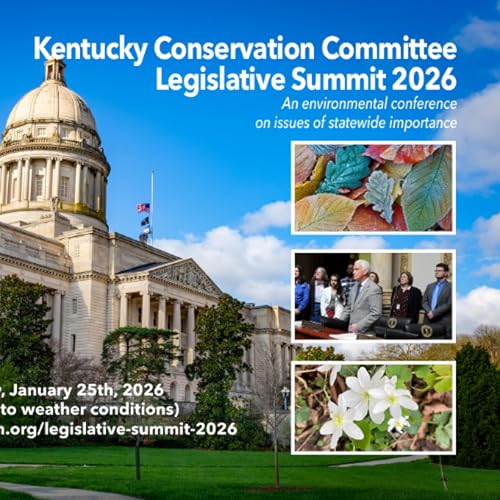We’re shoveling out from the winter storm of apathy and despair this week on Sustainability Now! Your host, Justin Mog, is delighted to welcome back into the studio Dr. Natasha DeJarnett to talk about the next installment of the UofL Envirome Institute’s “& Science” series, coming up on Thursday, Feb. 5th, with a focus on History & Science. The event begins with a reception at 5:15 pm, and the panel begins promptly at 6:00 pm. It’s taking place at Roots 101 African-American Museum (124 N 1st St). Please join us for the third installment of the “& Science” Forums organized by UofL's Christina Lee Brown Envirome Institute. During History & Science, we will celebrate community heroes and hear from an expert panel on the key intersections of history and science. The panel will discuss historic infrastructure affecting environmental health disparities; examine the policy and legal frameworks that shape local climate and environmental conditions; and encourage widespread participation in strengthening Louisville's environment. Please RSVP at https://www.eventbrite.com/e/history-science-tickets-1979812499481. The evening will feature: Speakers: • Dr. John Chenault (Associate Professor, Director of Anti-Racism Initiatives, UofL) • Ms. Hannah Drake (Cultural Strategist; Co-Executive Director, IDEAS xLab; Co-Founder, (Un)Known Project) • Dr. Swannie Jett (Chief Executive Officer, Park DuValle Community Health Center) • Dr. Lynn Pohl (Archivist, The Filson Historical Society) • The Honorable Attica Scott (Former Kentucky State Representative for District 41; Director of Special Projects, Forward Justice Action Network) • Dr. Monica Unseld (Founder and Executive Director, Until Justice Data Partners) "& Science" Trailblazer Awardee: • Dr. Kevin W. Cosby (Senior Pastor, St. Stephen Baptist Church; President, Simmons College of Kentucky) Also Featuring: • Dr. Natasha DeJarnett (Assistant Professor, Christina Lee Brown Envirome Institute, UofL) • Dr. Ricky L. Jones (Professor and Past Chair, Pan-African Studies; Baldwin-King Scholar-in-Residence, Christina Lee Brown Envirome Institute, UofL) About the Series: The Christina Lee Brown Envirome Institute is hosting this quarterly health forum called “& Science". The third installment of the series will focus on History & Science, featuring leaders from different historical and scientific backgrounds. The “& Science” series provides a community forum for conversations at the intersection of health, the environment & science. Topics explored throughout the first year of the series include communication, faith, history, art & science. Natasha DeJarnett, PhD, MPH, BCES, is the co-founder of the “& Science” series, an Assistant Professor in the School of Medicine, and a researcher with UofL’s Envirome Institute (https://louisville.edu/envirome). Dr. DeJarnett's research interests include the cardiovascular health burden of extreme heat exposure, air quality, and environmental health disparities. In addition, Dr. DeJarnett is passionate about environmental health research that informs policies and empowering communities through research engagement. As always, our feature is followed by your community action calendar for the week, so get your calendars out and get ready to take action for sustainability NOW! Sustainability Now! is hosted by Dr. Justin Mog and airs on Forward Radio, 106.5fm, WFMP-LP Louisville, every Monday at 6pm and repeats Tuesdays at 12am and 10am. Find us at https://forwardradio.org The music in this podcast is courtesy of the local band Appalatin and is used by permission. Explore their delightful music at https://appalatin.com
Más
Menos
 Jan 30 202659 m
Jan 30 202659 m
 Jan 29 202629 m
Jan 29 202629 m Jan 28 202658 m
Jan 28 202658 m 29 m
29 m 55 m
55 m Jan 26 202658 m
Jan 26 202658 m Jan 25 202629 m
Jan 25 202629 m
